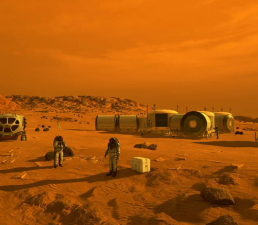Mars has fascinated humans for thousands of years, but only recently have we seriously considered moving there. Since the last landing on the moon in 1969, all eyes have been on the red planet and the race to reach this "other world". But will we see it in our lifetime? Today we are answering this extraordinary question; will our descendants be able to live on Mars? Do you believe it?

In fact, humans have been dreaming about this for more than 140 years. In 1877, Italian astronomers drew the first map of Mars, and the most exciting thing was the Martian canals marked on the map. Until the 1980s, it was generally believed that the Martian civilization had built a large canal network and developed technology far beyond that of humans, and many people even feared that they would invade the earth. But disappointingly, when the American Mariner 5 and Mariner 9 Mars probes landed on Mars in 1965 and 1971, they found that Mars was a barren land. Not only were there no Martians, but there was not even a blade of grass. But scientists still believe that it is too early to conclude that there is no life on Mars. We still have good reasons to believe that the life system that has evolved over billions of years on Mars is still surging with great vitality in the dark underground world of Mars.
Today, we know much more about Mars than we did in the past, and our expertise and confidence are growing with the passage of time. In the past few decades, we have launched probes and rovers to explore the planet, map it, study the atmosphere, and more importantly, look for liquid water. All efforts have been successful. We have mapped the surface of Mars, understood the composition of the air, and learned that there is still a lot of water in the Martian soil.
According to Mars exploration data, 2 billion years ago, Mars may have been more suitable for nurturing life than the Earth at that time. At that time, Mars had a thicker atmosphere, oceans, rivers and blue skies, and the world of life was prosperous. Unfortunately, the core of the earth cooled later, and Mars lost most of its atmosphere and water sources, and ultraviolet rays drove straight in and exterminated Martian life. But we know that the Earth has also experienced many mass extinctions of life and fought back. Perhaps Mars is just experiencing an ordinary dormant period of life.

Humans living on Mars will face many problems
- It takes 9 months to travel from Earth to Mars. We will face the problem of no gravity for a long time.
On Earth, bones and muscles always support our bodies, so they are always "moving". If you are in space, you don't need to overcome gravity, your body will undergo a series of adaptive changes, and the support of bones and muscles for the human body will be greatly reduced, resulting in reduced bone density and muscle atrophy.
Even if you do two hours of intense exercise every day, you will lose 1% to 2% of bone mass every month.
- Once you go to Mars, you must live on Mars for nearly 2 years. At this time, the two Earths and Mars will be close enough for you to return.
- Mars has only a weak magnetic field, and the atmosphere is so thin that it is almost a vacuum. Therefore, you will face solar and cosmic radiation, so that frequent outdoor activities will cause cancer. You'd better stay indoors in a radiation-proof room and wear protective clothing when you go out.
- The ground on Mars is full of salt and other chemicals that are toxic to plants. Plants cannot grow on the surface of Mars, and you will most likely not see any green plants there.
- The temperature difference between day and night on Mars is about 78 degrees. It is essential to understand the outdoor temperature before going out.
